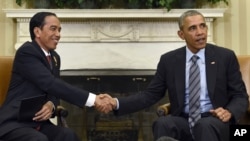The United States and Indonesia have agreed to deepen cooperation after talks the White House says are part of the U.S. effort to rebalance toward the Asia-Pacific region. President Barack Obama met with Indonesian President Joko Widodo on Monday.
Topics included climate change, security, trade, terrorism and maritime cooperation.
After the talks, Obama called Indonesia “a key strategic partnership” in the region. He noted it is one of the world’s largest democracies, with a population of roughly 250 million, that it is a Muslim country with a tradition of moderation and tolerance, its leadership role in the region and Jakarta’s role in trade, commerce and economic development.
The Indonesian president, who prefers to be called Jokowi, said his country is “an open economy. We are the largest economy in Southeast Asia,” he said. “And Indonesia intends to join the TPP (Trans-Pacific Trade Partnership.)
Indonesia represents half of Southeast Asia’s economy, but Murray Heibert with the Center for Strategic and International Studies said the country is highly protectionist.
“Trade levels with the United States are the level of Honduras and some of the countries in Central America. It’s got 250 million people. That’s pretty miserably small trade,” he said.
Although Jokowi expressed interest in joining the Trans-Pacific Trade Partnership, he faces intense opposition at home.
“He does have limits to how far he can go,” Heibert said.
The Indonesian president canceled plans to visit business leaders on the West Coast, because of raging forest and peatland fires at home. The blazes caused a haze of carbon emissions to linger over many areas. The fires are blamed on deforestation and El Nino weather patterns.
The White House said the talks are part of the U.S. pivot toward the Asia-Pacific region, where it seeks to increase Washington’s influence.
Obama hosted Japan’s president in April, China’s leader in September and the president of South Korea earlier in October.
Jokowi is the first Indonesian leader to visit the United States in a decade. He took office a year ago as an outsider, promising change in the world's most populous Muslim country, but like Obama, when he assumed power six years ago, has encountered economic difficulties.
The Indonesian chief is looking to attract more American investment in his country, where only 17 percent of the country's people are connected to the Internet, far less than in many countries throughout the world.
Indonesia balances its relations between the United States and China, but has been concerned about Beijing's maritime claims in the South China Sea.
